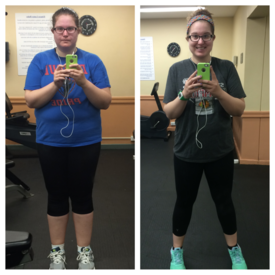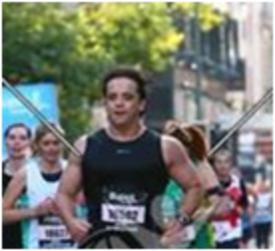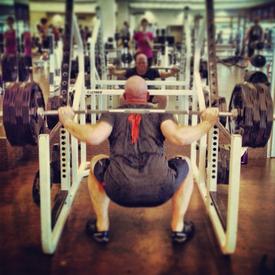Fat burning question
Options
Replies
-
I heard higher cardio is great for your heart but burns fat slower...and if you're at an average heart rate...it burns fat faster.
Did you read the replies before you asked the same question again?
It wasn't the same question I was just stating something...0 -
bump0
-
I heard that if you workout at a heart rate that is too much, you burn fat slower..is that true? I think that may be my problem.
It's not worth worrying about. If you are having problems with fat loss then the main culprit is likely to be your diet and the current deficit you are running (or may not be depending how accurate your calorie logging is in reality.)
I was going to write a long post about the fat burning zone but then decided just to nick the following by another user, Azdak:
"the fundamental idea behind the "fat burning" zone has been disproven and others reading this topic might make changes to their exercise routine that would be detrimental, under the mistaken idea that they were "burning more fat".
The body uses a mixture of fuel substrates -- primarily fats and carbohydrates--during exercise. The ratio of fats:carbs is determined primarily by the intensity of the workout. At lower intensities one burns a higher percentage of fat--that percentage decreases as intensity increases.
However, the type of fuel burned during exercise and the amount of fat burned during exercise has virtually NO EFFECT on oxidizing (burning up) stored body fat. Studies have shown pretty definitively that total fat oxidation over 24 hours is not affected by how much fat was "burned" during exercise. In other words, someone who burns more fat during exercise will burn less the rest of the day and vice versa--the body compensates so that, after 24 hours, total fat oxidation is the same.
The primary stimulus that causes the body to burn more fat is the maintenance of a negative energy balance--i.e. taking in fewer calories than you expend. Exercise helps by burning a large number of calories and contributing to the caloric deficit.
A balanced and effective workout program should include lower-intensity endurance training, medium-intensity tempo training and high-intensity interval training. That will help you maximize your calorie burn and give you the best chance to lose body fat."
Thank you, as I'm reading through the replies I'm wondering why people have forgotten the other side of the entire equation? You know the food side? Work out as hard as you want. You won't be getting anywhere if you don't eat properly.0 -
I heard that if you workout at a heart rate that is too much, you burn fat slower..is that true? I think that may be my problem.
It's not worth worrying about. If you are having problems with fat loss then the main culprit is likely to be your diet and the current deficit you are running (or may not be depending how accurate your calorie logging is in reality.)
I was going to write a long post about the fat burning zone but then decided just to nick the following by another user, Azdak:
"the fundamental idea behind the "fat burning" zone has been disproven and others reading this topic might make changes to their exercise routine that would be detrimental, under the mistaken idea that they were "burning more fat".
The body uses a mixture of fuel substrates -- primarily fats and carbohydrates--during exercise. The ratio of fats:carbs is determined primarily by the intensity of the workout. At lower intensities one burns a higher percentage of fat--that percentage decreases as intensity increases.
However, the type of fuel burned during exercise and the amount of fat burned during exercise has virtually NO EFFECT on oxidizing (burning up) stored body fat. Studies have shown pretty definitively that total fat oxidation over 24 hours is not affected by how much fat was "burned" during exercise. In other words, someone who burns more fat during exercise will burn less the rest of the day and vice versa--the body compensates so that, after 24 hours, total fat oxidation is the same.
The primary stimulus that causes the body to burn more fat is the maintenance of a negative energy balance--i.e. taking in fewer calories than you expend. Exercise helps by burning a large number of calories and contributing to the caloric deficit.
A balanced and effective workout program should include lower-intensity endurance training, medium-intensity tempo training and high-intensity interval training. That will help you maximize your calorie burn and give you the best chance to lose body fat."
Thank you, as I'm reading through the replies I'm wondering why people have forgotten the other side of the entire equation? You know the food side? Work out as hard as you want. You won't be getting anywhere if you don't eat properly.
I totally agree and thanks for pointing that out. I was just wondering strictly on the workout side though..but I agree it's an important factor.0 -
Agree with what has been said so far.
However, one advantage of lower intensity cardio that rarely gets mentioned is that you can carry on for longer and it's generally, depending on what you do, less draining on the body.
From personal experience, I can burn up to 900 calories in a one hour hard spinning session or doing an hour of P90X Plyo. But I can burn the same walking at 4mph around my local, hilly area for a couple of hours. True, the former are better for my cardio health and are far more time-efficient. But I can walk 5 or 6 days a week before I need a rest day. If I tried that with spinning or plyo I'd have bad knees or wasted, unrecovered muscles in no time.
A mix of activities and styles of cardio is undoubtedly the best option overall. (Plus diet and weights, of course ) 0
) 0 -
Thanks James. Great Post!0
-
I incorporate moderate and HIIT for all my clients. You can't always do HIIT because it is rough on the nervous system. And moderate doesn't increase your resting metabolic rate. So mixing the 2 is a good combination along with a good calorie deficit.
A.C.E. Certified Personal Trainer
IDEA Fitness member
Kickboxing Certified Instructor
Been in fitness for 28+ years and have studied kinesiology and nutrition0 -
Lower heart rates, which are below your anaerobic threshold, your body is utilizing a higher percentage of fat for energy. As your heart rate approaches your Ae Threshold, the more glycogen (sugar) is used as a fuel source. Eventually, your body will be fueling itself with only glycogen, which your body has a limited supply of. Once it runs out, It's like your car running out of anti-freeze. Bad things start to happen, lol.
You're probably wondering how to figure out your Ae? Go take a V02 Max test, everyone's threshold is different.0
Categories
- All Categories
- 1.4M Health, Wellness and Goals
- 391.6K Introduce Yourself
- 43.5K Getting Started
- 259.7K Health and Weight Loss
- 175.6K Food and Nutrition
- 47.3K Recipes
- 232.3K Fitness and Exercise
- 393 Sleep, Mindfulness and Overall Wellness
- 6.4K Goal: Maintaining Weight
- 8.5K Goal: Gaining Weight and Body Building
- 152.7K Motivation and Support
- 7.8K Challenges
- 1.3K Debate Club
- 96.3K Chit-Chat
- 2.5K Fun and Games
- 3.3K MyFitnessPal Information
- 23 News and Announcements
- 937 Feature Suggestions and Ideas
- 2.3K MyFitnessPal Tech Support Questions





